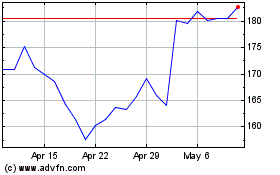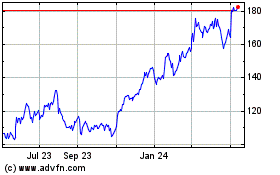Apple and Qualcomm Agree to Drop All Litigation -- 4th Update
17 April 2019 - 6:22AM
Dow Jones News
By Tripp Mickle and Asa Fitch
SAN DIEGO -- Apple Inc. and Qualcomm Inc. agreed to dismiss all
litigation between the two companies world-wide, ending a
long-brewing legal battle over how royalties are collected on
innovations in smartphone technology.
Financial terms of the agreement weren't disclosed.
The settlement to the patent dispute includes an undisclosed
payment from Apple to Qualcomm and settles all litigation involving
the contract manufacturers Apple enlists to make iPhones and
iPads.
Apple and Qualcomm, whose chief executives were expected to
testify in the trial, reached a six-year license agreement
effective April 1, including the option for a two-year extension
and a multiyear chipset-supply agreement. The companies didn't
disclose the financial terms of what Apple will pay in patent
licensing fees over the course of their six-year agreement.
Qualcomm said the agreement will add about $2 earnings per share
as modem chip shipments begin. Its stock surged in afternoon
trading following the announcement, jumping more than 20%. Apple
shares rose slightly.
The dramatic turn of events came as Qualcomm's lawyers were
preparing to wrap up their opening arguments, portraying Apple as a
bully who was forcing the chip maker to accept less money than it
deserves for its contributions to its smartphones. Earlier, Apple
had accused Qualcomm of forcing customers to pay twice to gain
access to its chips, as trial arguments got under way.
The agreement will "allow these tech companies to get back to
business and you to return to their everyday affairs," Judge
Gonzalo Curiel told the jurors.
The two-year feud started as global smartphone sales slowed,
pressuring both companies' businesses. Apple had paid Qualcomm
$7.50 in royalties on every iPhone it sold since 2007 -- a price
the parties reached with complex agreements that lowered Qualcomm's
standard royalty rate through rebate and incentive payments. Apple
also agreed to make Qualcomm the exclusive provider of modem chips
for iPhones from 2011 to 2016.
Apple added chips from Intel Corp. to some iPhone models in
2016, as its most recent contract with Qualcomm concluded. It then
slapped Qualcomm with a lawsuit in January 2017.
Other issues have heightened the distrust. For example, Qualcomm
executives suspected Apple of supporting a hostile takeover bid by
Broadcom Inc., and Apple executives were angered that Qualcomm
hired an opposition-research firm with ties to a news outlet that
published articles calling the iPhone maker Silicon Valley's
biggest bully.
Apple's legal challenge has left it without access to Qualcomm's
market-leading 5G modem chips, putting its most important product,
the iPhone, a step behind Android competitors in the race to the
next big advance in wireless.
Write to Tripp Mickle at Tripp.Mickle@wsj.com and Asa Fitch at
asa.fitch@wsj.com
(END) Dow Jones Newswires
April 16, 2019 16:07 ET (20:07 GMT)
Copyright (c) 2019 Dow Jones & Company, Inc.
QUALCOMM (NASDAQ:QCOM)
Historical Stock Chart
From Mar 2024 to Apr 2024

QUALCOMM (NASDAQ:QCOM)
Historical Stock Chart
From Apr 2023 to Apr 2024
